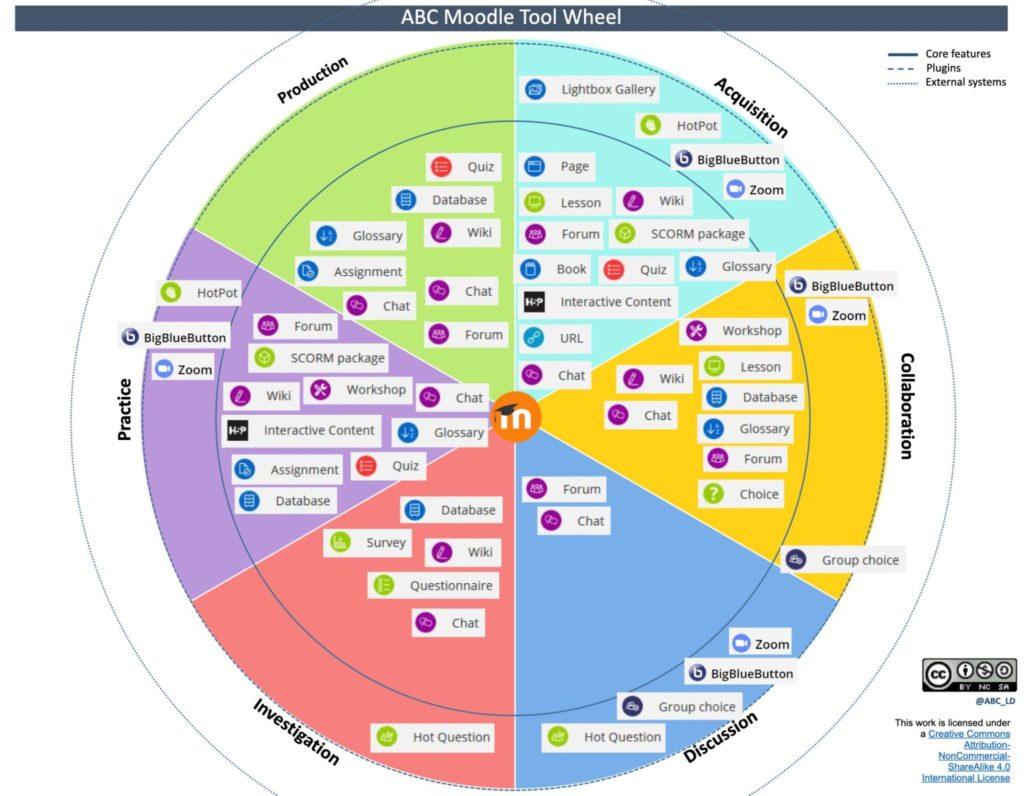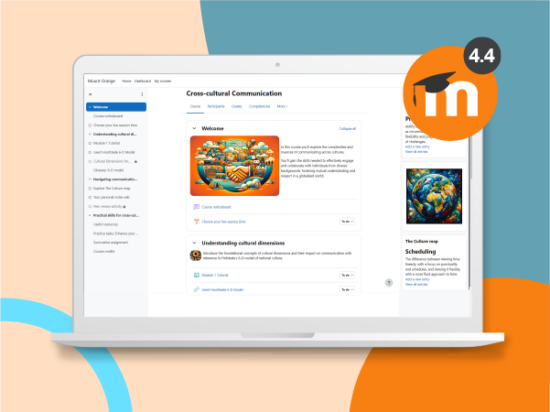Developed by Clive Young and Nataša Perović for University College London (UCL), ABC Learning Design is a high-energy, collaborative workshop to engage academic teams in order to develop, design or redesign online courses or programs. This method has been adopted and adapted by the Moodle Academy team to design the free courses and programs available on Moodle Academy.
During the workshop, academic teams work together to create a student-centred ‘storyboard’ showing the type and sequence of learning activities required to meet the course or program’s learning outcomes, and how these will be assessed. While the workshop encourages better pedagogical conversations, the outcome is very practical and participants can take away a series of actions to implement in their courses.
UCL has been using this method since 2015, and over 1400 teachers have used it to design blended and online learning experiences for new and existing courses and programmes; and to design short courses, such as Massive Open Online Courses (MOOCs)
The 6 learning types
ABC Learning Design is based on Professor Diana Laurillard’s Conversational Framework, where she identifies 6 types of learning, which are the building blocks for ABC Learning Design. According to the ABC Learning design team, “the six learning types have proved to be a very effective method to help teachers describe and discuss the student learning process. Students and non-teaching staff also find the learning types intuitive and easy to use and can produce innovative and creative storyboards with no prior experience of learning design”.
The 6 learning types, as described on the ABC LD cards, are:
Acquisition: Learning through acquisition is what learners are doing when they are listening to a lecture or podcast, reading from books or websites, and watching demos or videos
Collaboration: Learning through collaboration embraces mainly discussion, practice, and production. Building on investigations and acquisition it is about taking part in the process of knowledge building itself.
Discussion: Learning through discussion requires the learner to articulate their ideas and questions, and to challenge and respond to the ideas and questions from the teacher, and/or from their peers.
Investigation: Learning through investigation guides the learner to explore, compare and critique the texts, documents and resources that reflect the concepts and ideas being taught.
Practice: Learning through practice enables the learner to adapt their actions to the task goal, and use the feedback to improve their next action. Feedback may come from self-reflection, from peers, from the teacher, or from the activity itself, if it shows them how to improve the result of their action in relation to the goal.
Production: Learning through production is the way the teacher motivates the learner to consolidate what they have learned by articulating their current conceptual understanding and how they used it in practice.
In the ABC Learning Design workshop, each of the 6 learning types is represented in cards of a different colour, which enables trichromatic participants to quickly identify the learning types that are part of their storyboard and which ones are missing, or whether there’s an imbalance between types of acquisition – and address it.
From ABC to Moodle
When it comes to deciding on activities for each of the 6 types of learning, the ABC Learning Design team have created a very useful tool called the ABC Moodle Tool Wheel, which maps the Moodle tools and resources to each learning type. This makes it easy for workshop participants to write down specific types of Moodle activities for each of the learning types they’ve incorporated into their storyboard, and to start building their courses on Moodle following their storyboard.

The ABC Moodle Tool Wheel, created by @ABC_LD. This work is licensed under a Creative Commons Attribution-NonCommercial-ShareAlike 4.0 International License
As Covid-19 hit and teaching and learning had to shift to online, the ABC Learning Design team also came up with a way to adapt their workshops to online delivery. This online method is what the Moodle Academy team are using to design the Moodle Academy courses. Besides providing many resources and guides on how to run their workshop online, UCL developed an online, open source tool called Learning Designer.
Like the Learning types cards used in face-to-face ABC workshops, Learning Designer enables teachers to see the proportion of each learning type in their courses. However, Learning Designer takes this one step further: as participants input the activities that make up their courses in Learning Designer, they can specify the duration, group size, whether it’s synchronous or asynchronous, whether the teacher is present in the activity, and even attach resources. By analysing all this information, Learning Designer produces a chart that provides an overview of the learning experience that is being designed, allowing teachers to see where adjustments are needed. For example, if the chart shows a lot of acquisition and not much collaboration or discussion, the design team might decide to introduce more collaborative and discursive activities to the design.
Finally, Learning Designer also allows teachers to export their storyboard, made of different Moodle activities, into a word file to share with colleagues, and directly to a Moodle backup file, which they can then import into their Moodle course.
Learn more on the ABC Learning design website.
This content has been extracted from Moodle Academy’s webinar “ABC Learning Design”. You can join the associated course to watch the recording, complete the assessed activities and earn a badge.




